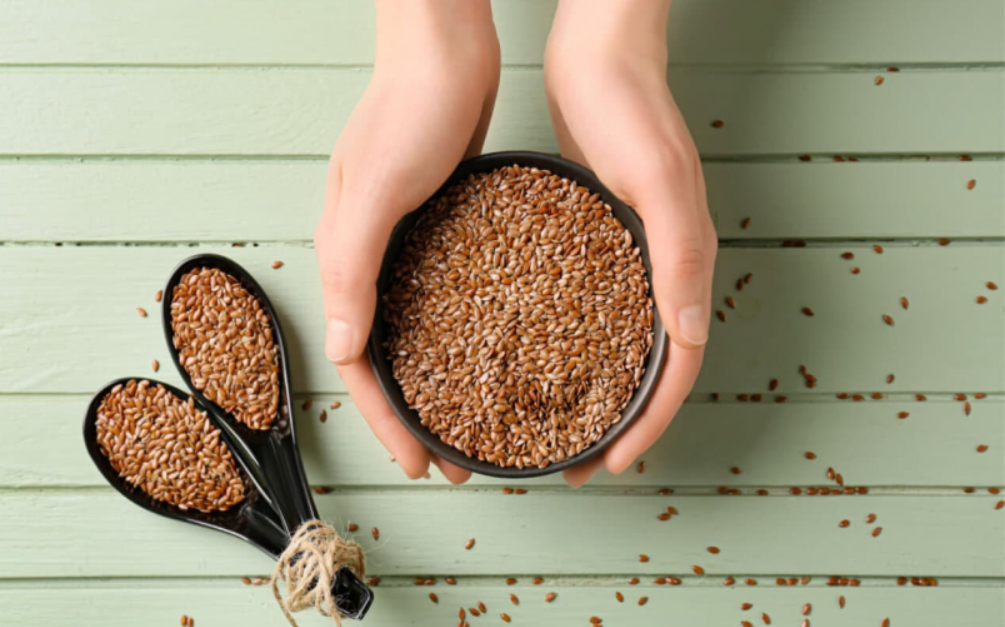Flaxseed is a superfood rich in omega-3 acids, fiber and protein, which have great health benefits.
If there is one food that is considered to be rich in omega-3 acids, it is undoubtedly salmon. Again, if someone asks you what food will provide you with fiber, you will answer – rye bread. But what would you say if we revealed that you probably have food in your house that is ten times richer in omega-3 acids than salmon and has three times the fiber of rye bread? It is flaxseed – a real nutritional treasure that we often associate with curing constipation.
But studies published in the well-known journal Nutrients reveal that flax itself is much more than a cure for hard stools. What does flaxseed contain? Flaxseed has an anti-inflammatory, antioxidant effect and regulates lipids in the blood. Therefore – a spoonful of flax seeds is like a pill that protects many aspects of your health.
Flaxseed is an exceptional food due to its high content of omega-3 fatty acids, especially alpha-linolenic acid (ALA). Omega-3 fatty acids are divided into three types: ALA (alpha-linolenic acid), EPA (eicosapentaenoic acid) and DHA (docosahexaenoic acid). Although ALA is found in abundance in flaxseed, the body can also convert it into EPA and DHA, which are essential for eye, brain and cardiovascular health.
Another benefit of flaxseed is fiber, about 2 grams per teaspoon. Most of these fibers are soluble, meaning they dissolve in water and form a gel in the digestive tract. This feature not only helps maintain healthy cholesterol levels, but also regulates blood glucose levels and improves the overall health of the digestive system.
Flaxseed is one of the best sources of lignans, polyphenolic compounds with antioxidant and phytoestrogenic properties. Lignans are good for the heart and help balance menopausal hormones. Flaxseed is also a good source of protein, which is important for tissue development and repair; they also contain small amounts of vitamins and minerals, such as vitamin B1 (thiamine), manganese and magnesium.
What is flaxseed good for?
As we have seen, flaxseed is a true superfood. Therefore, its health benefits are great. In terms of cardiovascular health, studies have shown that flaxseed reduces the formation of atheromatous plaques, protects against arrhythmias and lowers blood pressure and helps prevent heart attacks and strokes. In the area of diabetes, flaxseed lowers blood glucose levels in both type 2 diabetes and prediabetes. It also helps prevent symptoms of depression and ease menopausal symptoms.
Finally, it has a very positive effect on the intestinal microbiome thanks to its fiber content. It reduces constipation and symptoms of irritable bowel syndrome. All these findings suggest that flaxseed, whether in the form of seeds, oil or dietary supplements, may be a useful strategy for the prevention and treatment of many diseases, as the study authors point out.
How to include flaxseed in the diet?
There are many ways to incorporate flaxseed into your diet.
Add it to shakes or smoothies: you can mix it with fruit, yogurt and other ingredients according to your preferences.
Sprinkle it over cereal or yogurt: Simply sprinkle a tablespoon of flaxseed over cereal or yogurt. This adds a nice crunchy texture and lots of nutrients.
Add flaxseed to salads.
Add it to the dough: Add ground flaxseed to recipes for bread, muffins, biscuits or other baked goods. You can also use flaxseed oil as part of the fat content in recipes.
Egg substitute: You can use a mixture of ground flax seeds and water as an egg substitute in dough recipes. Mix one tablespoon of ground flaxseed with three tablespoons of water and let it sit until it has a slimy, egg-like texture.
Flaxseed water: Leave the flaxseeds soaked in water for several hours. Then strain the seeds and drink the resulting water. This can help you stay hydrated and provide some nutrients.
After reading this text you can also read about: Don’t Ignore It: A Symptom That Bones Are Becoming Weaker And Brittle



